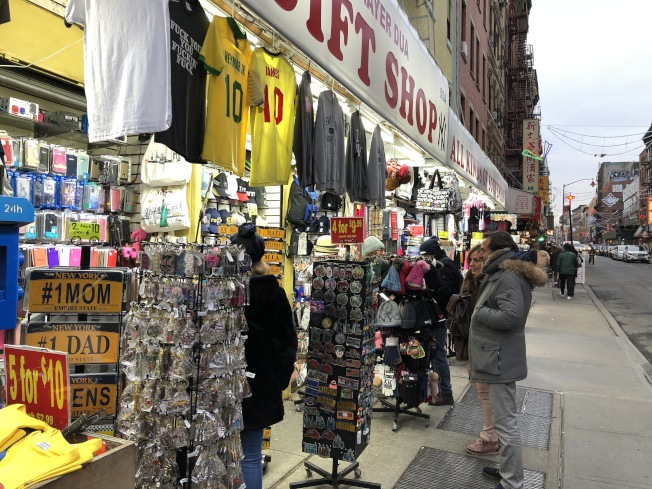Read the original story in Chinese at World Journal
Translated by by Rong Xiaoqing

World Journal
Chinatown’s gift shops saw a dip in business in 2019, which local leaders attribute to the trade war and fewer tourists.Gift shops lining the streets of Manhattan’s Chinatown complain that business was slow in 2019, a decline community leaders attribute to the trade war between the U.S. and China, which increased costs for the shops, as well as a reduction in the number of tourists.
Wellington Chen, executive director of Chinatown Partnership which runs the Chinatown Business Improvement District (BID), said on Dec. 4 that he can tell there are fewer tourists coming to Chinatown even by the amount of garbage the BID’s janitors collect on the street. He said the trade war helped drive away tourists to the neighborhood, and the economy is suffering, not only in Chinatown but citywide. Representatives from many BIDs in the city had a meeting recently to discuss what to do.
Chen said he’s heard of store closures taking place in nearby SoHo and Little Italy, as well as the Upper East Side and midtown Manhattan. The decline of tourists, accompanied by the increased minimum wage, have left many businesses struggling to keep their heads above water.
A survey conducted by American Express on National Small Business Saturday, which took place Nov. 30, found that $19.6 billion was spent on that day nationwide, a record. Chen says this means consumers are still buying — they just don’t spend in Chinatown.
The neighborhood is home to a number of old-style restaurants and gift shops, many of which could benefit from renovations to keep up with the tastes of the millennials, who have become a main segment of consumers. He points to Joe’s Shanghai, a long time restaurant in the neighborhood which recently moved to Bowery Street and still enjoys strong business in a very competitive environment, something Chen attributes to the eatery’s ongoing efforts to upgrade.
Eric Ng, president of the Chinese Consolidated Benevolent Association (CCBA), said some shops in Chinatown suffer from a lack of unique characteristics. Gift shops are everywhere, and they get their supplies from the same suppliers and sell them for similar prices, diluting customers across the neighborhood.
Chen said in the past, Chinatown was known as a place for good food. The intercity buses and medicine centers here are also well known, and should be further promoted to attract more tourists to Chinatown. He wants more tourists to know that Chinatown is not only a place for bargains, but it also has high-end shops and restaurants.








